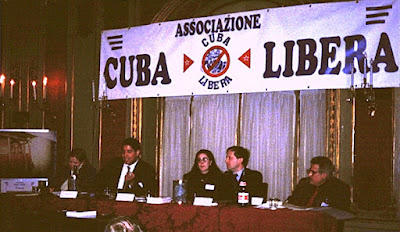Elian Strike Closes Little Havana
By Martha Irvine
Associated Press Writer
Tuesday, April 25, 2000; 9:34 p.m. EDT
 A group of demonstrators dressed in black marched through Miami Beach to express their pain. |
The protest over the Elian Gonzalez case brought honking cars and Cuban flags to the same streets where fires and violence broke out Saturday after armed federal agents grabbed the 6-year-old Cuban boy in a pre-dawn raid.
Except for a few coffee stands, the neighborhood's vibrant business community shut down on a hot, sunny day, while hundreds of protesters gathered on street corners or drove their cars in long, honking caravans through the streets.
"We are in mourning," said Angelo Gutierrez, 70. "I will buy nothing today."
The rest of the Miami metropolitan area went on with its day. Scattered businesses closed their doors and the morning traffic in the city was lighter than usual. The airport and Port of Miami suffered no difficulties, officials said.
Only two airport porters didn't show for work Tuesday, said supervisor Ileana Casasola. "I'm Cuban," she said. "I'd love to go support my people, but the problem is the airport is a busy place."
Many tourists didn't know of the strike. "They're causing more problems than they're solving," said Cleveland tourist Jackie Miller, breakfasting on South Beach. "Frankly, I'm a little tired of hearing about it."
Police said protests stayed peaceful, though two people were arrested for disorderly conduct. "We're hoping that ... this indeed is a day of reflection and contemplation and mourning as the Cuban exiles have called for," said Lt. Bill Schwartz.
Big businesses like American Airlines, which has 9,000 Miami-based employees, reported no staff shortages. At The Miami Herald, no reporters took the day off, though several support staff took vacation days at the paper and its Spanish-language daily, El Nuevo Herald, said Robin Reiter, vice president of human resources.
Larger corporations closed some operations – seven Publix supermarkets shut their doors, and a McDonald's in Little Havana closed, leaving its flag at half-staff.
Sony canceled its "Evening of Showcases," which featured singer Gloria Estefan, who supported Elian's Miami relatives, and other Latin music stars. The event was part of the festivities surrounding the Billboard Latin Music Conference and Awards that kicked off Tuesday in Miami.
Baseball players and coaches around the major leagues skipped games Tuesday night in protest. Tampa Bay's Jose Canseco was the most prominent player to sit out, joining six Florida Marlins, two San Francisco Giants and New York Mets shortstop Rey Ordonez. Several coaches joined them.
Florida third baseman Mike Lowell, pitchers Alex Fernandez and Vladimir Nunez – all of Cuban descent – decided to sit out. Dominican teammates Antonio Alfonseca, Jesus Sanchez and Danny Bautista joined them in a show of support.
Scattered effects of the strike could be felt throughout the county. The predominantly Hispanic city of Sweetwater kept going on a skeleton staff of mostly department heads, said Mayor Jose "Pepe" Diaz.
"We have to keep the city open for the public, but I do believe in the cause and I do stand with them," Diaz said.
In Hialeah, a city with a big Cuban population, the shopping district bustled.
However, one impromptu street protest protest several miles southwest of Little Havana grew to 300 by midday. A caravan of cars numbered at least 100. Spanish-language radio announced the names of businesses that closed and those that stayed open.
By early evening, about 130 protesters gathered outside the Freedom Tower, a former Customs building in downtown Miami where many Cubans entered the United States in the 1960s. They waved flags and signs and chanted "Libertad" as basketball fans streamed into the American Airlines Arena for a Miami Heat playoff game.
Across Biscayne Bay in Miami Beach, tourists lined up with cameras as about a thousand people – many of them wearing black clothing and electrical tape over their mouths – quietly walked 30 blocks from the trendy South Beach area to the city's Holocaust museum and back.
"We want international tourists to see what we are feeling," said John Suarez, a Florida International University student who helped organize the procession.
School officials said they had no information on attendance by students of teachers. But bank teller Dora Irizarry, whose bank shut down, took her two boys out of school, and they said many other students did the same.
She brought them to the home of Elian's Miami relatives for the first time. The Cuban-American community held months of protests outside the house in hopes of keeping the boy here.
"This is horrible, horrible. I don't have words," she said. "It's important for them to see this. It's important for them to know what freedom is about."
Down the street at the closed Zagami's Market, a Cuban flag hung over the store sign. Below hung a handwritten sign that read: "Clinton a traitor. Shame on you."
–––
On the Net: Miami-Dade County: http://www.co.miami-dade.fl.us
Free Cuba Foundation: http://www.fiu.edu/~fcf/
© Copyright 2000 The Associated Press




